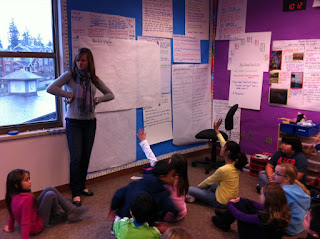Thanks for a great 2010. I look forward to all the work ahead with your students and you in 2011.
We've had a very busy final week of school before the break. Here are a few highlights:
Science/Social Studies
- We finished our studies of the different types of water erosion
- Students took two separate land & water assessments
- Began studying Lewis & Clark, within the context of exploration
- Steve Taylor made an entertaining, humorous, and educational presentation about Lewis & Clark. Thank you for your support in making this enrichment activity possible!
 |
| Steve Taylor's Lewis & Clark presentation involved talking puppets, magic, jokes, and audience participation! |
- Learned a new algorithm (partial products) that is helpful conceptually in developing your child's understanding of the place value that occurs in multiplication
- Combines our work lately with a game called multiplication wrestling with extended multiplication facts, and estimating with large numbers--ask your child to explain these three things and how they connect in the partial products algorithm
- Will learn lattice algorithm for multiplication method Friday--this one is a favorite of students!
- Students typed their clean copies & brought to school on USB stick or emailed them
- I scanned their images in, & students imported/compressed them in MS Word
- They saved the files as PDFs for our blog
- We had an Author Chair Celebration--see separate post below!
- Read Leah's Pony--a story about the dust bowl of the 1930s. Ask your student how the story connected with our land/water studies
- Read about exploration broadly, and then more specifically with regard to Lewis & Clark, and exploration of Washington State
- Mrs. Lederman read a story to our class
- Started Mountain Language word work program
- Read Aloud--Where the Red Fern Grows--we made some more progress. Ask your student what Billy's great challenge has been lately. How does the author stretch small moments?
 |
| Choir Concert. Choir students performed some great jazz numbers on Thursday! |



















